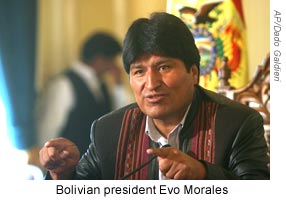Santa Cruz de la Sierra, Bolivia, June 8, 2007—Despite a relatively open press climate, President Evo Morales’s intolerance of media criticism is making working conditions for reporters increasingly difficult, a delegation from the Committee to Protect Journalists found during a week-long visit to Bolivia. Morales, while pledging to respect press freedom, accused the media of bias against his administration.
The delegation, which comprised CPJ board member and Pulitzer Prize-winning journalist Josh Friedman, and CPJ’s Americas Senior Program Coordinator Carlos Lauría, met with Morales, Vice President Álvaro García Linera and senior government officials, journalists, editors, media executives, and human rights activists in the capital La Paz and the opposition stronghold of Santa Cruz de la Sierra. CPJ will publish a report on press conditions in Bolivia shortly.
Journalists and media executives accused Morales, the country’s first indigenous leader, of being too thin-skinned.
“The administration of President Morales believes that any criticism is part of a conspiracy. There is freedom of expression in Bolivia, but the President’s constant verbal attacks are sending some worrying signals,” Pedro Rivero Jordán, executive director with the Santa Cruz-based daily El Deber, and president of the Bolivian National Association of the Press, told CPJ.
Journalists acknowledge that they are not persecuted by the authorities but they say that the constant barrage of criticism of the press makes covering events such as street protests difficult.
Morales accuses the media of political bias and of trying to discredit his administration.
“The capitalist system is using the media against the government,” Morales, a former coca grower elected in December 2005, told CPJ. “Journalists sympathize with me but the media owners are aligned in a campaign against my government,” Morales said.
Nevertheless, he affirmed his commitment to a free press. “It is important to protect freedom of expression and our position is to have more free expression,” Morales added.
Bolivian media also expressed concern about the government’s plans for the constituent assembly that is redrafting the constitution with the aim of strengthening indigenous rights.
Vice President García Linera said that the government had no plans “to impose coercive mechanisms to impose control” over the press. “The excesses in the use of information would not be controlled by the state. We respect and seek to promote freedom of expression,” said García Linera.
The CPJ delegation also met with Gastón Núñez, the official who runs the administration’s network of community radio stations, a project financed with a US$ 2-million investment from the Venezuelan government. More than two dozen community stations are already broadcasting to rural and indigenous communities. Núñez said the network did not carry government propaganda. Local journalists contend that the stations were designed specifically to give the administration a voice.
